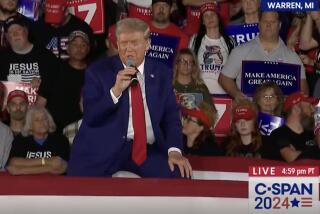Channeling Monroe
- Share via
As Barack Obama tries to address soaring rates of unemployment and home foreclosure, he would do well to bone up on a predecessor, James Monroe. In 1819, at a time when mortgage foreclosures had forced thousands of Americans from their homes and unemployment had soared to 16.8%, President Monroe presented a plan to Congress for restoring the nation’s economy.
At the time, tens of thousands of Americans were streaming westward across the Appalachian Mountains to buy federal land at $2 an acre, borrowing more than they could ever repay. As land prices soared, banks lent every penny they had and more -- no questions asked. Many banks issued their own colorful bank notes -- backed by no-one-knew-what. One Rhode Island bank with a capitalization of only $45 issued bank notes with a total face value of $800,000.
With demand for land all but insatiable, speculators rushed to borrow bank notes as fast as banks could print them and buy land to resell to gullible would-be settlers, who expected to repay loans from crops they hoped to plant on the properties. The frenzy was so great that purchasers never checked whether the speculators actually owned the lands they sold or whether they sold the same lands multiple times.
Concerned over runaway speculation and fraudulent land sales, Congress passed a law requiring banks to back the paper they issued with specie -- coins, gold, silver and so forth. As the first few insolvent banks closed their doors, depositors staged a run on the rest and forced bankers to try to call in loans or shut their doors. More than 1,000 shut their doors, and the bubble popped. Speculators, borrowers, homeowners, banks and the government were broke. Thousands lost their homes; tens of thousands had no work; and Republicans in Congress refused to expand the already enormous federal deficit to help them.
Outraged at congressional inaction, Monroe began working to shame Congress into passing an economic recovery program. Demanding “increased harmony” from Congress, he scolded obstructionists in and out of government. “Discord does not belong to our system,” he thundered. “The American people ... constitute one great family with a common interest. ... Possessing as we do all the raw materials, the fruit of our own soil and industry, we ought not to depend in the degree we have done on supplies from other countries. ... The capital which nourishes our manufactures should be domestic.”
Monroe ordered his secretary of the Treasury to disburse millions of dollars from the Bank of the United States -- the 19th century equivalent of the Federal Reserve -- to help states build and expand the national infrastructure. Monroe put tens of thousands of Americans back to work building a vast network of roads, turnpikes and canals that linked every region of the nation with outlets to the sea and shipping routes to other continents.
A great new “National Road” linked the Potomac River to the Ohio River and opened the West to large-scale farming, with thousands of tons of grain, furs and other raw materials pouring over the Appalachians to Eastern manufacturers and cargo vessels in Eastern ports. Improvements in the steamboat lowered transportation costs and increased the speed with which goods traveled to market on the Mississippi and Ohio rivers and other waterways. And in one of the most spectacular engineering schemes the world had ever seen, the first 15 miles of the 360-mile-long Erie Canal opened in upper New York state. It eventually linked the Great Lakes with the Hudson River and the Atlantic Ocean and helped make the United States the wealthiest nation on Earth.
Monroe’s plan ultimately ended the depression and ushered in the greatest period of prosperity the nation has known. As the economy recovered, government deficits turned into surpluses, and Monroe rejoiced. “At no period of our political existence,” he declared, “have we had so much cause to felicitate ourselves at the prosperous and happy condition of our country. The abundant fruits of the Earth have filled it with plenty. ... In contemplating the happy situation of the United States ... I consider it my duty to recommend to Congress the repeal ... [of] internal taxes.” And with that, Congress abolished all property taxes and other internal taxes.
With the rest of the world at war, Monroe refused to allow foreign enemies to provoke us into costly overseas entanglements. Instead of wasting national resources in overseas wars, he invested in rendering America’s defenses impregnable and warned the world it had more to gain by trading with us than attacking us.
In the end, Monroe modernized the nation and created an “Era of Good Feelings” that united Americans and left his few opponents unable to even field a presidential candidate in the 1820 elections. Monroe became the only president other than George Washington to win election to the presidency unopposed.
More to Read
Get the L.A. Times Politics newsletter
Deeply reported insights into legislation, politics and policy from Sacramento, Washington and beyond. In your inbox twice per week.
You may occasionally receive promotional content from the Los Angeles Times.










